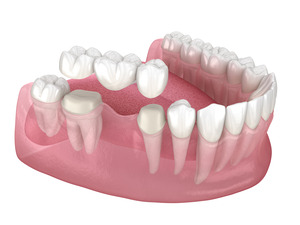
A dental bridge makes it possible to enjoy a complete smile again by filling in the gap left by one or more missing teeth. However, even a high-quality dental bridge could potentially fail if you don’t take the right steps to protect it. Below is a quick look at 3 common causes of dental bridge failure – and what you can do to avoid them.
1. Lack of Proper Oral Hygiene
Dental bridges may not be susceptible to cavities, but the teeth that support them still are. If you don’t keep the area around your dental bridge clean, harmful bacteria could make their way under the prosthesis and start attacking your natural teeth. As said teeth weaken over time, your dental bridge could come loose.
You need to give your dental bridge the same level of attention that you give the rest of your smile. Be sure to brush thoroughly in the part of the mouth where the bridge is located, and don’t overlook the area where the prosthesis meets the gums.
2. Bad Oral Habits
Do you sometimes chew on your fingernails when you’re nervous? Do you often find yourself crunching ice cubes and hard candy? Do you ever use your teeth to tear packages open? All of these are examples of habits that could potentially damage or even break your dental bridge.
In order to keep your replacement teeth safe, you should identify potentially problematic habits and take steps to break them as soon as possible. This can help you avoid exposing your dental bridge to unnecessary wear and tear.
3. Bruxism
Sometimes you may grind or clench your teeth at night without even realizing it. This condition is referred to as bruxism, and it’s known to significantly wear down teeth if it’s left alone for too long. Needless to say, constantly being exposed to the pressures of teeth grinding is less than ideal for your dental bridge as well.
Fortunately, it’s possible to protect your dental bridge and the rest of your smile from bruxism by wearing a custom-made nightguard. This is an oral appliance that resembles a mouthguard that you might wear while playing sports. A nightguard can keep the upper and lower rows of teeth separated while you slumber, thus preventing the most severe consequences of bruxism.
A well-made dental bridge can last for years, but the possibility of failure will always be present. Keep a close eye on the condition of your dental bridge; if you notice any concerning signs, you should bring them to the attention of your dentist right away.
About the Author
Dr. Walter Mick went to the Ohio State University School of Dentistry for his Doctor of Dental Surgery, and he is currently a proud member of the Ohio Dental Association. He can provide expertly made dental bridges to help his patients re-complete their smiles after tooth loss. To schedule a consultation with Dr. Mick at Mick Family Dental Care in Reynoldsburg, visit his website or call (614) 864-4618.
